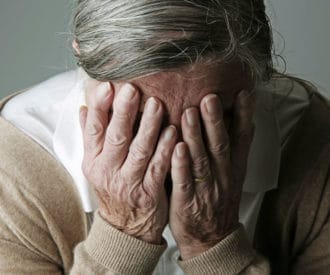
Get the essential facts about Alzheimer’s
Alzheimer’s is a disease, not a normal part of aging.
Alzheimer’s disease is the most common form of dementia, affecting about 1 in 8 people over age 65.
It causes 60 – 80% of all dementia cases and is the 6th leading cause of death in the United States.
We explain what Alzheimer’s disease is, common symptoms, causes, and treatment options.
What is Alzheimer’s disease?
Alzheimer’s is a progressive brain disease, which means that it worsens over time. It destroys memory and thinking skills and, in later stages, physical functions.
In the early stages, memory loss and other symptoms are mild. In late-stage Alzheimer’s, people can no longer communicate or respond to their environment.
Most people with Alzheimer’s first show symptoms when they’re in their mid-60s. But about 5% develop symptoms before age 65. When that happens, it’s called early-onset Alzheimer’s.
Scientists don’t know what causes Alzheimer’s, but they suspect that the brain damage and symptoms come from amyloid plaques and Tau tangles in the brain.
Plaques are deposits of amyloid proteins that build up. Tangles are twisted fibers of tau protein that build up inside nerve cells.
People with Alzheimer’s experience physical symptoms as well as cognitive because neurons in the brain stop functioning, lose connections with other neurons, and die. Those neurons are needed to send messages between different parts of the brain and from the brain to parts of the body.
The damage typically starts in the part of the brain that’s responsible for forming memories. As more neurons die, more parts of the brain are affected.
In the final stage of Alzheimer’s, damage has spread throughout the brain and the brain itself has shrunk significantly.
Alzheimer’s symptoms
The most common early symptom of Alzheimer’s is difficulty remembering newly learned information.
Many people also notice trouble finding the right words, vision or spatial issues, and impaired reasoning or judgment.
One of the biggest challenges with people in the earlier stages of Alzheimer’s is that they might not recognize they have a serious problem.
Other common symptoms include:
- Having a hard time with everyday tasks
- Trouble focusing
- Feeling confused or frustrated, especially at night
- Trouble communicating
- Mood swings – outbursts of anger, anxiety, and depression
- Feeling disoriented and getting lost easily
- Physical problems, like a strange walk or poor coordination
As Alzheimer’s spreads through the brain, the person will need a higher level of care as symptoms increase in severity.
More advanced symptoms include:
- Mood and behavior changes
- More serious memory loss and behavior changes
- Disorientation and increasing confusion about events, time, and place
- Paranoia and suspicion toward family, friends, and professional caregivers
- Trouble dressing, bathing, and using the toilet
- Difficulty speaking, swallowing, and walking
- Inability to recognize or name family members or people close to them
Alzheimer’s vs dementia
Dementia is an umbrella term for a collection of symptoms. Alzheimer’s is a type of dementia.
Dementia is caused when the brain is damaged by stroke, multiple TIAs (transient ischemic attacks or mini strokes), injury, or diseases like Alzheimer’s.
There are also 8 other types of dementia you might not know about.
Causes of Alzheimer’s disease
Scientists still don’t understand what causes Alzheimer’s disease in most people.
Early-onset Alzheimer’s is often caused by genetic mutations.
Late-onset Alzheimer’s seems to be caused by changes in the brain that develop over decades. The causes probably include genetic, environmental, and lifestyle factors.
It’s still not known why the disease primarily affects older people.
There could be something in the relationship between cognitive decline and health conditions like heart disease, stroke, high blood pressure, diabetes, and obesity.
It’s possible that reducing the risk of these conditions could also reduce the risk of Alzheimer’s.
Doctors recommend living a healthy lifestyle to help reduce the risk of cognitive decline and Alzheimer’s disease. That includes healthy eating, regular exercise, maintaining social connections, and staying mentally active.
Alzheimer’s treatment and life expectancy
Treatment
At this time, there is no cure for Alzheimer’s. But there are 6 FDA-approved drugs that may improve quality of life for both the person with Alzheimer’s and their family.
These drugs could help delay, reduce, or stabilize Alzheimer’s symptoms like memory loss and confusion. They may also help control some behavioral symptoms.
Life expectancy
Alzheimer’s disease typically progresses in three stages.
An early stage with minimal symptoms, a middle stage of increasing cognitive impairment, and a final stage where the person needs help with all activities of living and may not be able to communicate or engage with the world.
People with Alzheimer’s live an average of 8 years after symptoms become noticeable. But survival can range from 4 – 20 years, depending on age and other health conditions.
Recommended for you:
- 15 Insightful Dementia Communication Tips
- Solve Challenging Alzheimer’s Behaviors with Expert Communication Tips
- 5 Tips for Dealing with Caregiver Guilt in Dementia Care
By DailyCaring Editorial Team





Lou Battaino
Very good to receive information that describes what is actually occuring in every day life . I have been diagnosed as ” Mild Cognitive ” , and am aware of issues you describe , forgetting people you know, forgetting travel routes that you have travelled many times in your life. It is difficult to accept that things in your life are changing . I would like to try the available medications , with the hope they can lessen the onslaught of alzheimers .
DailyCaring
It’s great that you’ve been working with your doctor to find out what’s causing your symptoms. Being aware of this early means that you can be proactive about monitoring and treating the mild cognitive impairment.
We’ve got an article about it that may be helpful – Mild Cognitive Impairment: Not Dementia, But More Than Normal Forgetfulness https://dailycaring.com/mild-cognitive-impairment-not-dementia-but-more-than-normal-forgetfulness/
Helen Anderson
I’m caring for my 89yr old dad who has alzheimers he keeps aski g to go see his mum/dad who died many many years ago and now is showing signs of depression and anxiety can anyone please help me to find out how to deal with the situation. I’m getting no help with doctors etc I’m at my witsend on how to cope with this dad was in hospital recently with chest infection for 10days and was very confused dilemma. He is loosing the will to live now I don’t want to give up on him.
Very worried daughter
DailyCaring
We’re sorry to hear that this is happening. We’ve got some articles to explain why these behaviors are happening and suggestions for how to reduce and manage them so that you can help your dad feel better.
– 3 Ways to Respond When Someone with Alzheimer’s Says I Want to Go Home https://dailycaring.com/when-someone-with-alzheimers-says-i-want-to-go-home-3-ways-to-respond/
– Therapeutic Fibbing: Why Experts Recommend Lying to Someone with Dementia https://dailycaring.com/why-experts-recommend-lying-to-someone-with-dementia/
– Delirium in Seniors Is Often Mistaken for Dementia: Know the Signs https://dailycaring.com/hospitalization-can-cause-delirium-in-seniors-know-the-signs/ (explains why a hospitalization can cause or worsen confusion)
– When Depression and Dementia Collide https://dailycaring.com/when-depression-and-dementia-collide/
elizabeth p.
We hired a caretaker for Mom 8 hours a day for over a year. Now, she stopped standing and has been bedridden for 2 weeks and has already acquired two bedsores in two weeks. What have we done wrong and what are suggestions to improve her care? She has hospital bed but doesn’t actually sit up but scrunches up and is not eating much of anything but sometimes tries to eat such as blueberries.
DailyCaring
We’re sorry to hear about your mom’s decline. You may want to contact her doctor to let her know of this sudden change and have the doctor examine her for any new health issues.
While she’s in bed, these tips can help prevent bedsores:
– Bed Sores: Causes, Stages, Early Detection https://dailycaring.com/bed-sores-causes-stages-early-detection/
– 3 Helpful Tips for Bed Sores Prevention and 2 Common Treatments https://dailycaring.com/3-helpful-tips-for-bed-sores-prevention-and-2-common-treatments/
Connie Bundy
As I am caring for my husband who now lives in a hospital bed full time, I love receiving this email. I live in Toronto, Ontario. We receive visits at home twice a day from personal support workers and a visit from a nurse once a week. Thankfully because my husband is very peaceful, I have been able to keep him at home.
I remember crying the first time he did not know who I was but I now accept this and just introduce myself each time I walk in the room.
It is such a sad disease.
Please keep sending this information. Thanks.
DailyCaring
We’re so glad that our email newsletter is helpful! It’s wonderful that you’re able to care for your husband in your home and that you have support from in-home caregivers and from a nurse. We’re so sorry that he isn’t able to show that he recognizes you 🙁 It’s wonderful that you’ve come to accept it and that you’re able to remind him 💜
Anna Baker
I care for my older brother, he is in middle stage. He was a very busy talented person, with a very short focus time now, how can I get him interested in something or anything?
Thank you for the help, I am in my 5th year.
DailyCaring
Dementia takes a toll on the brain and can make even simple tasks of daily living a big challenge. For some people, that can be so mentally tiring that they won’t be very interested in additional activities.
Or, perhaps the damage in the brain caused by the dementia has reduced his attention span. Or, if he finds certain tasks or activities to be too challenging, that could cause him to quickly lose interest.
If your brother does have the energy for and interest in activities, perhaps you could provide a variety of things that he could switch between, like a puzzle, photos to look at, playing cards, etc.
It may take some trial and error to find activities that suit his current ability level and his interests. We’ve got dozens of activity ideas for people with Alzheimer’s or dementia here – https://dailycaring.com/tag/alzheimers-dementia-activities/
Christina
I understand that Alzhimer’s is an umbrella term for many other memory and/or health concerns such as brain injury, dementia, etc. I am asking what else falls under Alzhimer’s umbrella?
DailyCaring
That’s a great question. Dementia is a syndrome, which is a group of symptoms that relate to a specific disorder or disease. It’s not a disease in itself.
Dementia is caused when the brain is damaged by diseases like Alzheimer’s, mini strokes, or traumatic brain injury.
Alzheimer’s disease is a form of dementia. It’s the most common type and accounts for 60 – 80% of all dementia cases.
We’ve got more info here — What’s the Difference Between Alzheimer’s and Dementia? https://dailycaring.com/alzheimers-and-dementia-know-the-difference/
Bryan Johnson
Finding the articles very informative and helpful
DailyCaring
Thanks for the feedback, we’re so glad our articles are useful!